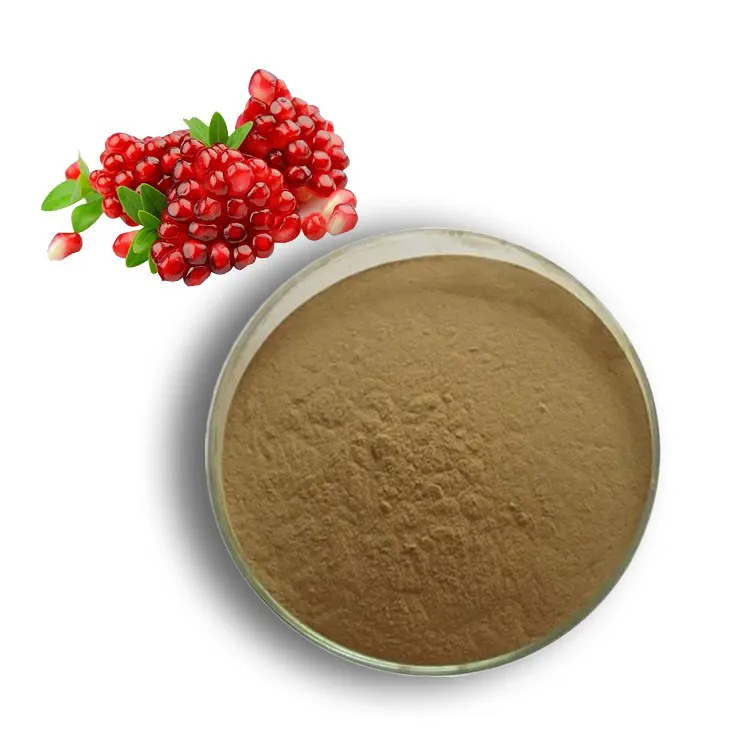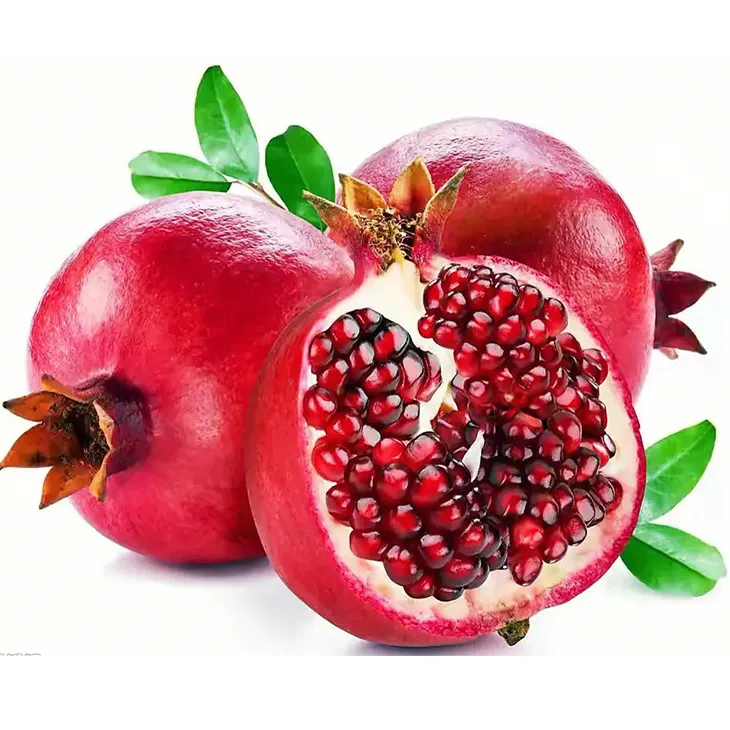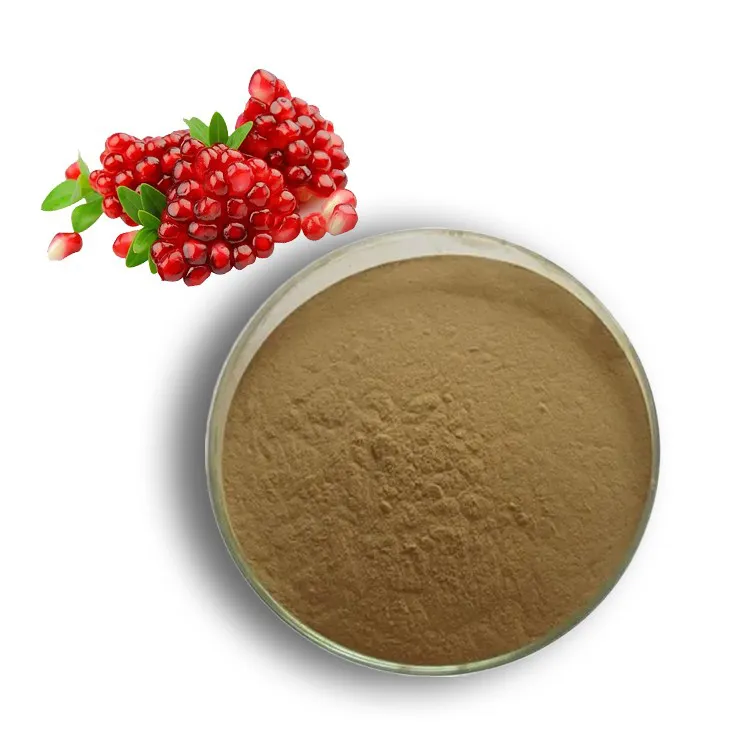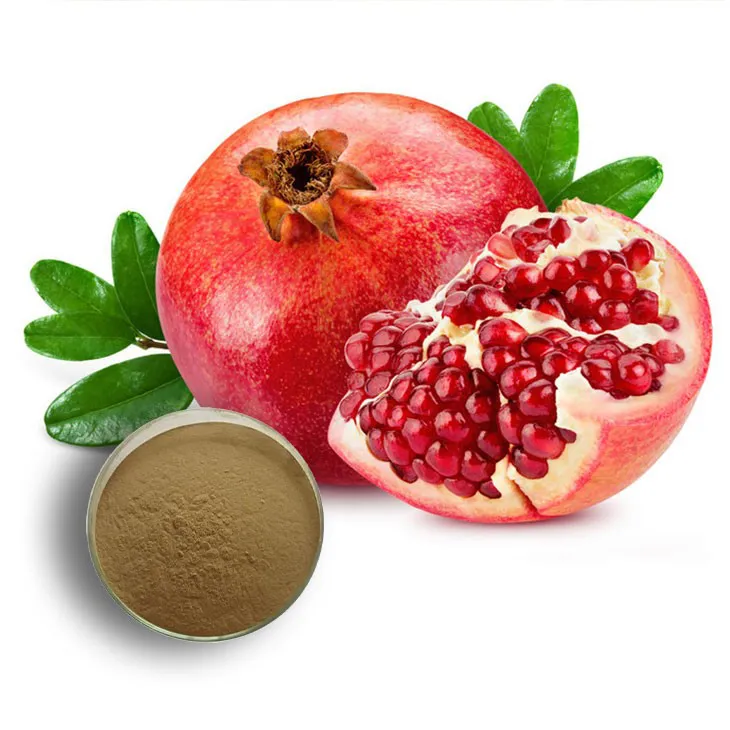- 0086-571-85302990
- sales@greenskybio.com
The flavor of ripe pomegranates and natural pomegranate extracts.
2024-11-14

1. Introduction
Pomegranates, with their alluring appearance and rich history, have become a subject of great interest in recent years. The flavor of ripe pomegranates is a complex and enticing blend that has been celebrated across different cultures. Additionally, natural Pomegranate Extract, which captures many of the essence of the fruit, has found numerous applications in various fields. This article will explore the flavor profile of ripe pomegranates, the extraction process of Pomegranate Extract, and its significance in culinary, health, and beauty aspects.

2. The Flavor Profile of Ripe Pomegranates
Sweetness and Tartness Balance: Ripe pomegranates are known for their unique balance between sweetness and tartness. The sweetness is a result of the natural sugars present in the fruit, which develop as the pomegranate ripens. At the same time, the tartness adds a refreshing zing that cuts through the sweetness, creating a harmonious taste experience. This balance makes pomegranates a versatile ingredient in both sweet and savory dishes.
Aromatic Complexity: The aroma of a ripe pomegranate is a complex blend of fruity and floral notes. When you cut open a ripe pomegranate, you are greeted with a heady fragrance that has hints of berries and a subtle floral undertone. This aromatic complexity not only enhances the eating experience but also makes pomegranates a desirable addition to perfumes and scented products.
Juicy Texture and Its Impact on Flavor: The juicy texture of pomegranate seeds plays an important role in delivering the flavor. As you bite into the seeds, the burst of juice releases the sweet - tart flavor, intensifying the overall taste. The texture also adds a pleasant mouthfeel, which is part of what makes pomegranates so enjoyable to eat.

3. The Extraction of Natural Pomegranate Extract
3.1. Traditional Extraction Methods
Cold - Pressing: One of the traditional methods of extracting pomegranate extract is cold - pressing. This method involves mechanically pressing the pomegranate seeds and arils to extract the juice. Cold - pressing is preferred as it helps to preserve the natural flavor and nutritional content of the pomegranate. The resulting juice can then be further processed to obtain the extract.
Solvent Extraction: Solvent extraction is another method that has been used. In this process, solvents such as ethanol are used to extract the active compounds from the pomegranate. However, this method requires careful purification to ensure that no solvent residues are left in the final extract.
3.2. Modern and Advanced Extraction Techniques
Supercritical Fluid Extraction: Supercritical fluid extraction, using substances like carbon dioxide in a supercritical state, has emerged as a more advanced method. This technique allows for more precise extraction of specific compounds from the pomegranate. It has the advantage of being a clean process, as the carbon dioxide can be easily removed, leaving behind a pure extract.
Ultrasound - Assisted Extraction: Ultrasound - assisted extraction utilizes ultrasonic waves to enhance the extraction process. The waves help to break down the cell walls of the pomegranate, facilitating the release of the desired compounds. This method is known for its efficiency and can often result in a higher yield of extract.

4. Culinary Applications of Ripe Pomegranates and Pomegranate Extract
In Desserts: Pomegranates and their extract are a wonderful addition to desserts. In a classic pomegranate sorbet, the natural tartness of the fruit or its extract provides a refreshing contrast to the sweetness. Pomegranate seeds can also be sprinkled over cakes, puddings, or ice creams, adding both a pop of color and a burst of flavor.
In Savory Dishes: In savory cooking, pomegranate can be used in marinades for meats. The acidity in the pomegranate or its extract helps to tenderize the meat while imparting a unique flavor. Pomegranate molasses, which is a concentrated form of pomegranate extract, is a popular ingredient in Middle Eastern cuisine, used in dishes like kebabs and stews.
In Beverages: Pomegranate juice, whether freshly squeezed or made from extract, is a popular beverage on its own. It can also be used as a base for cocktails, such as the pomegranate martini. Additionally, pomegranate extract can be added to smoothies to boost their nutritional value and flavor.

5. Health Benefits of Pomegranate and Its Extract
Rich in Antioxidants: Pomegranates are loaded with antioxidants, such as polyphenols. These antioxidants help to combat free radicals in the body, which are associated with various diseases, including cancer and heart disease. The antioxidant content in pomegranate extract is concentrated, making it a powerful addition to a healthy diet.
Anti - Inflammatory Properties: Both pomegranates and their extract have anti - inflammatory properties. Chronic inflammation is linked to many health problems, and consuming pomegranate can help to reduce inflammation in the body. This makes it beneficial for conditions such as arthritis.
Heart Health: Pomegranate has been shown to have positive effects on heart health. It can help to lower blood pressure, reduce cholesterol levels, and improve blood flow. The compounds in pomegranate extract are thought to play a role in these heart - healthy benefits.
6. Beauty Applications of Pomegranate and Its Extract
Skincare: In skincare, pomegranate extract is used for its antioxidant and anti - aging properties. It can be found in moisturizers, serums, and face masks. The antioxidants in the extract help to protect the skin from environmental damage, while also promoting collagen production, which is essential for maintaining firm and youthful - looking skin.
Haircare: Pomegranate extract is also beneficial for hair. It can be used in shampoos and conditioners to strengthen the hair follicles, reduce hair fall, and add shine to the hair. The nutrients in the extract help to nourish the scalp, promoting healthy hair growth.
7. Conclusion
In conclusion, the flavor of ripe pomegranates is a multi - faceted delight that has been harnessed in various ways through the extraction of natural pomegranate extract. From the culinary world, where it adds a unique taste to both sweet and savory dishes, to the health and beauty industries, where it offers a range of benefits, pomegranates and their extract have proven to be a valuable resource. As research continues, we can expect to discover even more applications and benefits of this remarkable fruit and its extract.
FAQ:
Question 1: What are the main flavor components in ripe pomegranates?
The main flavor components in ripe pomegranates include sweet and tart notes. There are natural sugars like fructose that contribute to the sweet taste. The tartness comes from organic acids such as citric acid. Additionally, it has a unique fruity aroma which is a combination of various volatile compounds.
Question 2: How is natural pomegranate extract made?
Natural pomegranate extract is typically made through processes such as cold - pressing or solvent extraction. Cold - pressing involves mechanically squeezing the pomegranate fruits to obtain the juice which can then be further processed into an extract. Solvent extraction uses solvents like ethanol to extract the active compounds from the pomegranate parts, usually the seeds or the peel, and then the solvent is removed to get the pure extract.
Question 3: What are the health benefits of consuming pomegranate or its extract?
Pomegranates and their extracts are rich in antioxidants such as polyphenols. These antioxidants can help in reducing oxidative stress in the body, which may lower the risk of chronic diseases like heart disease and cancer. They may also have anti - inflammatory properties, improve digestion, and contribute to healthy blood circulation.
Question 4: In which culinary applications can ripe pomegranates and their extract be used?
Ripe pomegranates can be used in various culinary applications. The seeds can be added to salads for a burst of flavor and texture. The juice can be used in making sauces, marinades, and even in desserts like sorbets and puddings. Pomegranate extract can be used to flavor beverages, such as cocktails and smoothies, or in baking to add a unique fruity flavor.
Question 5: What are the beauty applications of pomegranate extract?
Pomegranate extract is used in beauty applications due to its antioxidant properties. It can be found in skincare products like moisturizers, serums, and masks. It may help in reducing signs of aging such as wrinkles and fine lines by protecting the skin from free radical damage. It can also improve skin tone and texture, and may have anti - inflammatory effects on the skin, which is beneficial for conditions like acne.
Related literature
- The Nutritional and Therapeutic Properties of Pomegranates"
- "Pomegranate Extract: From Fruit to Functional Ingredient"
- "Flavor Profiles of Ripe Pomegranates and Their Culinary Significance"
- ▶ Hesperidin
- ▶ citrus bioflavonoids
- ▶ plant extract
- ▶ lycopene
- ▶ Diosmin
- ▶ Grape seed extract
- ▶ Sea buckthorn Juice Powder
- ▶ Beetroot powder
- ▶ Hops Extract
- ▶ Artichoke Extract
- ▶ Reishi mushroom extract
- ▶ Astaxanthin
- ▶ Green Tea Extract
- ▶ Curcumin Extract
- ▶ Horse Chestnut Extract
- ▶ Other Problems
- ▶ Boswellia Serrata Extract
- ▶ Resveratrol Extract
- ▶ Marigold Extract
- ▶ Grape Leaf Extract
- ▶ blog3
- ▶ blog4
- ▶ blog5
-
Organic Tongkat Ali extract powder factory.
2024-11-14
-
How to make powder with ashwagandha extract.
2024-11-14
-
Rosehip extract manufacturers from China.
2024-11-14
-
The best cat's claw extract in nature.
2024-11-14
-
Chinese Dandelion Leaf Extract Suppliers.
2024-11-14
-
Grape Leaf Extract
2024-11-14
-
Moringa powder
2024-11-14
-
Peppermint Oil
2024-11-14
-
Mulberry Extract
2024-11-14
-
Acai Berry Extract
2024-11-14
-
Curcuma Longa Extract/Turmeric extract
2024-11-14
-
Marigold Extract
2024-11-14
-
Baicalin
2024-11-14
-
Acerola Juice Powder
2024-11-14
-
Garcinia Cambogia Extract
2024-11-14





















